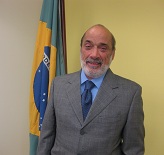Bernardo Pericas, Consul General of Brazil in San Francisco
BayBrazil: Brazil had a remarkable growth last year. What are your expectations for 2011?
Bernardo Pericas: The Brazilian economy is expected to grow 4.5% in 2011. National public policy will be geared towards continuous growth, with expansion of income and revenue. It is the country’s goal to continue the expansion, maintaining the growth pattern we had in the past years, which shall be reached with additional investments, savings and social achievements. Foreign direct investments in 2010 registered a record high of $ 48.5 billion, consolidating Brazil as a major investment destination. The expectations are high for Brazil and with the continuation of successful policies, such as the national development plan and the growth acceleration program, the government will attain a productive and sustainable transformation in the country.
BayBrazil: What are the main challenges for Brazil’s new president Dilma Rousseff?
Bernardo Pericas: We have been living one of the best periods in our country’s history: millions of new jobs were created, our growth rate more than doubled and we no longer depend on foreign financial assistance. We have the largest middle class ever and there was a significant decrease of poverty. One of President Dilma Rousseff’s priorities is to continue to work for social inclusion, a goal to be achieved with the improvement of the public health, education and security sectors. It is important to maintain economic stability and GDP growth, but also to contain inflation in order to have a healthy economic expansion. For the major upcoming events – the 2014 Soccer World Cup and the 2016 Olympic Games – it is imperative that we invest in infrastructure. And with the great discovery of the pre-salt oil reserves, there is also the challenge of developing the appropriate technology to make the best use of these new resources.
BayBrazil: How do you compare Brazil’s growth with other emerging economies?
Bernardo Pericas: Together with other BRIC countries, Brazil had a significant growth last year. China grew 10.5%, India grew 8.3% and Russia, 3.8%. Brazil ended 2010 with a growth rate around 8%, accompanied by large foreign reserves, a strong currency, inflation under control, low unemployment and a democratic government strongly backed up by the people. The economic figures are especially significant if we consider that they were achieved in a negative context for the world economy. They can be credited, among other factors, to a wise economic policy, which included promoting a better distribution of income inside the country, a large internal market and a very diversified external trade, evenly distributed among different regions of the world.
Brazil has been growing consistently. From 2000 to 2010 Brazil climbed from the 16th largest economy of the world to the 8th place.
It also is very interesting to note that Brazil is responsible for the 5th highest trade surplus for the United States, totaling $11.4 billion in 2010, which clearly demonstrates its importance to the largest economy in the world.
BayBrazil: In the last few years, there has been an increasing interest on Brazil worldwide. Is Brazil more influential now?
Bernardo Pericas: There is no doubt that Brazil has been increasing its presence in the world, something that has been recognized by the international press and by many foreign Governments. Today’s presence and influence of Brazil is commensurate with its ranking as a major economy, its political stability and with a very active foreign policy, devoted to peace and dialogue. Brazil always plays a constructive role in the international scenario, acting in strict observance of the Purposes and Principles of the Charter of the United Nations, an organization so vitally linked to the history of San Francisco.
BayBrazil: Brazil ethanol producers hope the U.S. will lift the tariff it imposes on the product. Is there a progress in that dialogue?
Bernardo Pericas: Unfortunately not. At the end of 2010, the U.S. Senate approved the extension of national corn producers subsidies and imposition of tariffs over imported ethanol, that were set to expire at the end of that year. The tariffs remain at $ 0.54 per gallon through 2011. The Brazilian Government, together with the Brazilian Sugarcane Industry Association, will continue to discuss this matter with the American authorities and private enterprises. I hope that next year this tariff will be eliminated or at least significantly reduced, taking into account not only the interests of the Brazilian producers, but also the interests of the American consumers.
BayBrazil: You’ve worked in many countries as a diplomat. Tell us about your experience representing Brazil.
Bernardo Pericas: I had the privilege of representing Brazil in multilateral organizations and before foreign Governments. To me it was always a very gratifying experience to represent a nation that I am proud of. In the international organizations I did my best to promote the interests of my country. In my bilateral postings I always tried to develop and improve our relations for the mutual benefit of Brazil and of the countries where I was accredited.
BayBrazil: What everyone should know about Brazil?
Bernardo Pericas: Everyone should know that beyond soccer and carnival, Brazil is a country determined to increase its presence in the world and to progressively assume responsibilities commensurate with its importance. Brazil is now a stable economy, with steady growth and democratic government, a country that was barely affected by the last world economic crisis mainly because of its strong public policies. Brazil has established its position as one of the more important and fastest growing economies in the world and will continue to vigorously pursue the goal of economic development with social justice.








